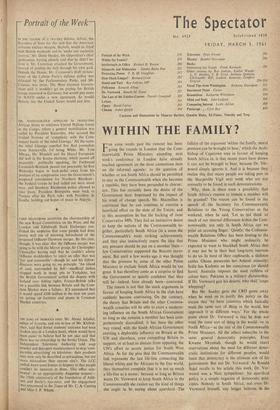Portrait of the Week
IN -me COURSE of a two-day defence debate, the Secretary of State for Air said. that the American airborne nuclear weapon, Skybolt, would be fitted with British warheads and be 'under our exclusive control,' Mr. Denis Healey, the Opposition's chief spokesman, having already said that he didn't be- lieve it. Mr. Crossman attacked the Government, instead of putting the ball through his own goal. Outside the House, Mr. Crossman's draft restate- ment of the Labour Party's defence policy was defeated by the Parliamentary Party, and Mr. Cousins was cross. The West German Govern- ment said it wouldn't go on paying for British troops stationed in Germany, but would pay more to NATO under a new agreement. So would lit ita in. but the United States would pay less.
MR. IIAMMARSKJoLD APPEALED to twenty-two African States to reinforce United Nations forces in the Congo, where a general mobilisation was called by President Kasavubu, who accused the United Nations of 'complicity with the Com- munist bands of the rebel Gizenga.' All the same, the rebel Gizenga expelled five Red journalists from Stanleyville, for being White. Mr. Tom Mboya, Mr. Blundell and the liberal Europeans did well in the Kenya elections, which passed off peaceably: politically speaking, Sir Ferdinand Cavendish-Bentinek passed out peaceably. Sir Roy Welensky began to back-pedal away from his position of no compromise over the Government's proposed constitution for Northern Rhodesia: the Federal troops he had called out were stood easy, and Southern Rhodesian police allowed to take leave. President Bourguiba went back, to Tunisia after his Paris talks with President dc Gaulle, holding out hopes of peace in Algeria.
LORD SIIAWCROSS ACCEPTED the chairmanship of the new Royal Commission on the Press, and the London and Edinburgh Stock Exchanges con- firmed the suspicion that some people had done pretty well out of knowing beforehand of the Proposed Odhams-Thomson merger. By this time, though, it was clear that the Odhams merger was going to be with the Mirror group, Sir Christopher Chancellor having said that he couldn't advise Odhams stockholders to reject an offer that was 'fair and reasonable'—though he and his fellow- directors were going to, on principle. 'An island of coal, surrounded by fish'—unofficial strikes stopped work in many pits in Yorkshire, but the British Government-settled the dispute with Iceland over fishing rights. Franco-British talks on a possible link between Britain and the Com- mon Market were a failure: ICI announced that It would spend £100 million in the next ten years on setting up factories and plants in Common Market countries.
*
THE KING OF MOROCCO DIED. Mr. Alcxei Adjubei, editor of Izvestia, and son-in-law of Mr. Khfhsh- chev, said that Soviet students' suitcases had been broken into in a London hotel, which would have been easier to believe had he not also said that there was no censorship in the Soviet Union. The Independent Television Authority told soap Powder and detergent manufacturers to stop 'com- parative advertising' on television: their products may now only be described as miraculous, but not more miraculous than anyone else's. The LCC pulled down some houses in Stepney so that people couldn't be immoral in them. This office cele- brated—in an appropriately Augustan manner— the 250th anniversary of the foundation of Addi- son and Steele's Spectator, and the engagement was announced in the Times of Mr. C. A. Cuming and Miss J. P. Whent.






































 Previous page
Previous page